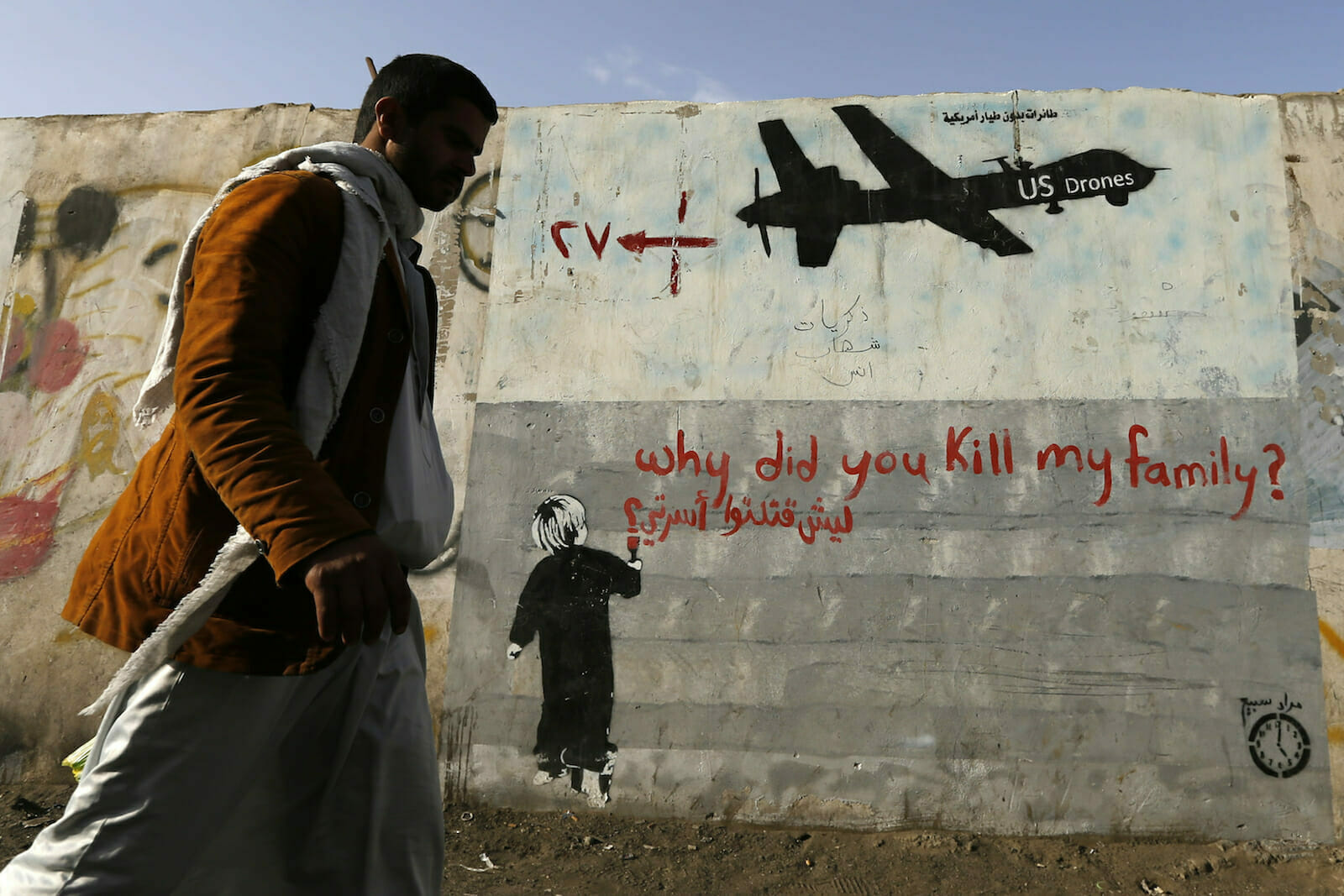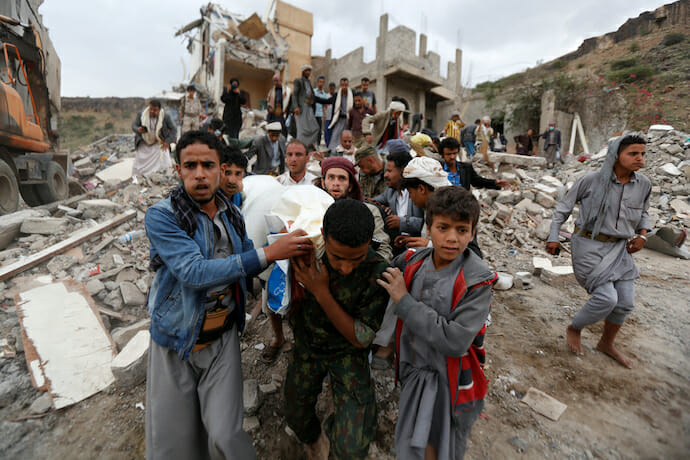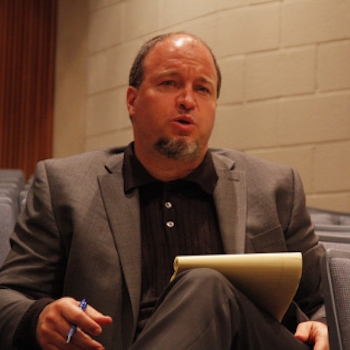
Progressive Surge Propels Turning Point in U.S. Policy on Yemen
The US House of Representatives passed a potentially historic resolution on February 13, 2019, calling for an end to US military support for the Saudi-led coalition’s intervention in Yemen that began in 2015. Although the US government has never formally declared its involvement in the war, it assists the coalition with intelligence and munitions and supports the aerial campaign with refueling and targeting. The United States is therefore complicit in the myriad atrocities the coalition has committed against Yemeni civilians, which Human Rights Watch and Amnesty International have characterized as war crimes.
What is already historic about the resolution (introduced by Democratic Representatives Ro Khanna of California and Mark Pocan of Wisconsin) and its Senate counterpart (introduced by Independent Bernie Sanders of Vermont, Republican Mike Lee of Utah and Democrat Chris Murphy of Connecticut) is their invocation of the War Powers Resolution of 1973, which restrains a president’s capacity to commit forces abroad. Aimed to prevent “future Vietnams,” the act gives Congress the authority to compel the removal of US military forces engaged in hostilities absent a formal declaration of war.
The House resolution was the first time Congress flexed its War Powers muscle in the 45 years since that resolution’s passage. The Senate passed a parallel resolution in December, but the measure died when the Republican leadership refused to bring it to a vote. These congressional moves not only register opposition to US involvement in this war but also strike a major blow against unlimited executive power when it comes to launching war. This long overdue Congressional action to constrain executive war-making, however, would not have been possible without a tremendous grassroots mobilization against US involvement in this disastrous war and the surging progressive tide that is raising deeper questions about US foreign policy.
Anti-war activists in the United States have been organizing against US support for the Saudi intervention in Yemen since 2015. While these efforts made an impact on the public debate about Yemen, they failed to move the policy needle—until an unexpected chain of events in late 2018 gave the campaign new traction and occasioned a momentous grassroots mobilization. The national organizing campaign is led by a combination of Yemen-oriented groups (the Yemen Peace Project, the Yemeni Alliance Committee and others) along with more established anti-war organizations like Just Foreign Policy, Win Without War, Code Pink and Peace Action. The addition of the ascendant Democratic Socialists of America contributed to the momentum. Yet it was the confluence of events outside the control of these groups—but to which these groups were well-positioned to rapidly respond—that propelled the campaign into broad Congressional support for War Powers resolutions in early 2019.
This campaign is poised to change not only US policy on Yemen but possibly the longstanding US-Saudi relationship. To be sure, major obstacles stand in the way of such a shift—notably, the Israel lobby and the swampy Donald Trump-Jared Kushner ties with Gulf monarchs. But the tide is now turning, and the 2020 presidential election could change the equation even more dramatically.
Game-Changers
The Obama administration gave the green light for the Saudi bombing campaign in 2015, dubbed Operation Decisive Storm, as a way to placate Saudi Arabia’s furious opposition to the Iran nuclear deal, which they viewed as a betrayal and a sign that Washington was pivoting to Tehran. Some commentators retrospectively regard the Iran deal as wrongheaded given the catastrophe that has unfolded in Yemen. But this imagines that Obama’s decision to sign off on the kingdom’s military campaign was automatic or inevitable. It was neither. The problem was not the Iran deal itself, but rather the decision to appease the Saudis in Yemen.
The Saudis viewed Trump’s election as a godsend. Here was someone who embraced their assertion that Iran was the source of most of the region’s problems and shared their determination to isolate and confront Tehran. Trump’s first foreign visit as president was to Riyadh, where he told the ensemble of autocrats, monarchs, and thugs what they wanted to hear: They have US support. Immediately after the May 2017 gathering, the Saudis stepped up their aerial assault on Yemen, and Trump announced a massive new weapons deal with the kingdom.
As the war intensified and the humanitarian crisis deepened, a broad coalition of US anti-war activists emerged and shifted their attention to Yemen, initiating a variety of educational events, protests, and meetings to pressure congressional leaders. Despite their efforts, it took two events in the summer of 2018—one a horrific act of violence in Yemen that illuminated all that was wrong with US involvement, and the other a horrific act of violence in Istanbul not directly related to the war itself—to spark a major opening in public consciousness and on Capitol Hill.

On August 9, 2018, a Saudi-led coalition warplane bombed a school bus in Saada, northern Yemen, killing several dozen children between the ages of six and 11. Mainstream media coverage of this event was unusually extensive and graphic, with CNN airing chilling video footage of the final moments inside the bus before the bomb struck. The video found itself in heavy rotation and went viral on social media. The visceral imagery of children on a school bus struck a deep nerve among many Americans who otherwise had not been following events in Yemen.
Reports that the warplane in question was sold to Riyadh by Washington, and that the bomb was manufactured in the United States, began to materialize. The Yemen-based human rights organization Mwatana played an important role by providing CNN access to a cache of documents showing fragments of American-made bombs at the scene of multiple attacks in which civilians were killed and injured, going back to 2015. Mwatana’s engagement with the US media also drew upon the knowledge and connections of US-based organizations that had long been working to draw attention to the direct role of the United States in the little-understood war. The horror of the school bus bombing, followed by this investigative surge, had a palpable effect on public opinion as Washington’s direct role in the suffering of Yemeni civilians came into public focus.
The second event, the October 2, 2018 assassination of the Saudi journalist Jamal Khashoggi, was the game-changer. When it was revealed that the Washington Post contributor was dismembered with a bone saw in the Saudi consulate in Istanbul and that Khashoggi’s murder was directed by the highest levels of the Saudi regime, virtually the entire Washington foreign policy world condemned Saudi Crown Prince Mohammed bin Salman for his brazen brutality. “The Khashoggi killing shocked official Washington, which was forced to overcompensate for having endorsed Crown Prince Mohammed bin Salman as an enlightened reformer,” Yasmine Farouk observes. “The humanitarian consequences of the war in Yemen added to that so that the kingdom in its entirety has become entangled in the current polarization of US politics.”
Many Yemenis are ambivalent about what might be called the Khashoggi effect—the ways in which the Saudi journalist’s brutal murder has drawn attention to the injustices of the war in Yemen. Abdulrasheed Alfaqih, Executive Director of Mwatana, conveys this ambivalence in his observation that “Yemen is one big Saudi consulate.” “All Yemenis are like Khashoggi,” he notes, “but without the Washington Post.”
But Khashoggi’s murder proved pivotal on the legislative front when a handful of Republican senators joined Democrats in their support for Senate Joint Resolution 54, the War Powers measure to end US support for the coalition’s military operations in Yemen. Just a few months earlier, in March 2018, this resolution had been rejected by the Senate. But following the school bus bombing, revelations of Washington’s complicity in such atrocities and the Khashoggi affair, the Senate passed the Sanders-Lee-Murphy resolution in December 2018. While outgoing Speaker Paul Ryan blocked the House resolution on his way out of office, a new version, House Joint Resolution 37, passed the Democratic-controlled House in February 2019. Euphoria was widespread in progressive circles: Anti-war activists celebrated not just the passage of the resolution, but the critical role they played in bringing it about.
Mobilizing a Coalition
Since the beginning of 2018, a coalition of organizations have worked around the clock mobilizing grassroots support for congressional action. Groups like Win Without War, Just Foreign Policy, the Yemen Peace Project, Code Pink, Peace Action, the Yemeni Alliance Committee, the Friends Committee on National Legislation, Action Corps and the Fellowship of Reconciliation have worked closely with congressional allies, providing policy expertise and helping draft resolutions (both Senate and House versions). These organizations have mobilized their members and supporters around the country to pressure their congressional representatives to co-sponsor and vote for the resolutions. They organized rallies at US Senate offices in Nevada, Arizona, Illinois, New York, New Jersey, Rhode Island and Maine (as well as on Capitol Hill), resulting in grassroots and media pressure on every Democrat who voted against the Yemen resolution in March 2018, which had a direct impact on the historic Senate vote in December.
While many efforts were coordinated, the mobilization was broad and diffuse enough to pressure congressional representatives across the country. In November, the Yemeni Alliance Committee, Just Foreign Policy, and Action Corps organized rallies at the San Francisco and Los Angeles offices of two key House Democrats, Nancy Pelosi (then-House Minority Leader, now Speaker) and Adam Schiff. Until then, Pelosi’s position on Yemen was unclear. Yemeni and Yemeni-American activists figured prominently in both actions. Within 24 hours of the rallies, both Pelosi and Schiff agreed to co-sponsor the original House resolution.
Employing creative means, Chicago activists in November 2018 led by Voices for Creative Nonviolence, Just Foreign Policy and the Chicago chapter of Peace Action held a powerful demonstration at Chicago’s Federal Building, placing 40 blue backpacks on the ground with the names of the children killed by the Saudi missile fired at their school bus. A teach-in on US involvement in the Yemen war held the next day at a packed auditorium at Loyola University featured the Yemeni-Canadian activist and Michigan State professor Shireen Al-Adeimi, who has emerged as one of the key voices on Yemen. Students at Loyola, DePaul and the University of Chicago have made Yemen a central focus of their activism.
Democratic Socialists of America, which now has more than 55,000 members nationally, has also played an important role. In November 2018 the organization issued a forceful statement on Yemen. In January 2019, it held a national video conference to educate and spark its members to participate in the National Day of Action for Yemen on February 4, 2019, which mobilized support for the current House and Senate resolutions to end US support for the Saudi military intervention.
A Left-Right Alliance on Yemen?
Yemen has become an important subplot in a larger story: the development of a new progressive foreign policy vision in Congress. A central figure in this story is Rep. Ro Khanna, who was first elected to Congress in 2016 and has emerged as a leading member of the Congressional Progressive Caucus. With his frequent appearances on such shows as All in with Chris Hayes and Democracy Now! and the Intercept podcasts of Jeremy Scahill and Mehdi Hasan, Khanna has become a prominent voice in progressive and anti-war circles. Khanna goes beyond advocating simply for the end of US support for the Saudi-led coalition in Yemen: He wants to stop all US military assistance to Saudi Arabia.
@TuckerCarlson offers a devastating critique interventionism and shows how much of the foreign policy establishment has failed the American people. There is an emerging, left right coalition of common sense for a foreign policy of restraint. https://t.co/fwP90EKN4e
— Ro Khanna (@RoKhanna) February 15, 2019
At the same time, Khanna is part of a disconcerting trend in certain quarters of the anti-war left, sometimes expressing affinity with right-wing reactionaries whose opposition to neoconservatism overlaps with their own. In February 2019, Khanna tweeted about an article by Fox News’ Tucker Carlson in The American Conservative magazine: “Tucker Carlson offers a devastating critique of interventionism and shows how much of the foreign policy establishment has failed the American people. There is an emerging, left-right coalition of common sense for a foreign policy of restraint.”
Carlson may be a critic of neoconservatism, but he is also a defender of white nationalism and a purveyor of demonizing rhetoric about immigrants and Muslims. Praising someone like Carlson—especially without offering this caveat—risks rendering Khanna’s anti-war position hostile to Yemeni-Americans and many other allies in the progressive push to end the war in Yemen.
Talk of a left-right coalition has been gaining traction in some anti-war circles, particularly since Trump’s election. To be sure, the War Powers resolution could not have made progress without making common cause with some conservatives. Republican Sen. Mike Lee of Utah, for example, has been an instrumental ally on Yemen. But to speak of a broad left-right coalition, as Khanna and others do, risks alienating many progressives who fiercely oppose “America First” nationalism (read: white nationalism).
Rep. Tulsi Gabbard of Hawaii is also frequently quoted and retweeted in anti-war circles despite her well-documented Islamophobia, her enthusiastic support for the chauvinistic Hindu nationalism of Indian Prime Minister Narendra Modi, her praise for brutal dictators like Egypt’s Abdel Fattah al-Sisi and her cooperation with the right-wing organization that arranged her trip to Syria to meet with the war criminal Bashar al-Assad.
Sunnis have been killing Shia since the massacre at Karbala in 680 AD. If we wait until they stop killing each other, we will stay for a thousand years or more. I agree with @realDonaldTrump. Bring the troops home.
— Senator Rand Paul (@RandPaul) January 16, 2019
The troubling politics of this left-right coalition did not originate in Congress. Many progressives and anti-war activists, for example, contributed to the virality of this tweet from Sen. Rand Paul: “Sunnis have been killing Shia since the massacre at Karbala in 680 AD. If we wait until they stop killing each other, we will stay for a thousand years or more. I agree with @realDonaldTrump. Bring the troops home.” Many progressives, however, oppose building a left-right coalition that overlooks Orientalist and racist distortions about the Middle East and Muslims on the basis of shared support for a smaller US military footprint. Such a coalition would be hostile, if not unrecognizable, to many of the people in whose name progressive activists often claim to speak.
Bernie, the Democratic Party, and US-Saudi Relations
Unlike in 2016, when Bernie Sanders seemed to shy away from foreign policy issues, foreign policy has become a major focus as he enters the presidential race for 2020. In recent months he has issued an internationalist manifesto and delivered a major foreign policy address at Johns Hopkins University’s School of Advanced International Studies. With Sanders’ timely leadership on ending US involvement in the war in Yemen, his increasingly critical views on US-Saudi relations and his broader anti-authoritarian internationalist vision, the contours of a Sanders-administration foreign policy are taking shape and could become a reality: Every poll shows Sanders beating Trump in a general election. As with domestic issues, Sanders’ influence over the terms of the Democrats’ foreign policy debate will be significant.
Moreover, every Democratic senator running for president is on board as a co-sponsor of the Sanders-Lee-Murphy resolution on Yemen. This development is remarkable and may portend a major shift in US foreign policy—at least toward Saudi Arabia. Resetting US relations with the Saudi kingdom, which Gilbert Achcar has felicitously called “the most reactionary state on earth,” would go well beyond the Obama-Clinton-Kerry legacy—indeed, well beyond any previous Democratic administration—and have far-reaching repercussions in the Middle East.
If US policy moves in this progressive direction, the grassroots mobilization to end US involvement in the war in Yemen—particularly the surge of 2018 and 2019—will be a key reason.
This article was originally published in the Middle East Report.

